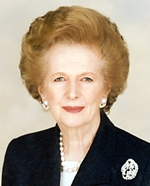UK’s ‘Iron Lady’ Margaret Thatcher dead
08 Apr 2013
 Former British prime minister Margaret Thatcher died today following a stroke, her family said. She was 87.
Former British prime minister Margaret Thatcher died today following a stroke, her family said. She was 87.
Baroness Thatcher, known as the 'Iron Lady' during her tenure, was Conservative prime minister from 1979 to 1990, making the UK's only woman prime minister to date and also the longest-serving British PM in 200 years.
She will not have a state funeral, but will be accorded the same status as Princess Diana and the Queen Mother.
The interment ceremony, with full military honours, will take place at London's St Paul's Cathedral. The union jack above Number 10 Downing Street and Parliament has been lowered to half-mast.
Prime Minister David Cameron called her a "great Briton"; and the Queen spoke of her sadness at the death.
"She didn't just lead our country, she saved our country, and I believe she'll go down as the greatest British peacetime prime minister,'' Cameron said.
International tributes also poured in. US President Barak Obama showered lavish encomiums on her.
''With the passing of Baroness Margaret Thatcher, the world has lost one of the great champions of freedom and liberty, and America has lost a true friend.
''As a grocer's daughter who rose to become Britain's first female prime minister, she stands as an example to our daughters that there is no glass ceiling that can't be shattered. As prime minister, she helped restore the confidence and pride that has always been the hallmark of Britain at its best. And as an unapologetic supporter of our transatlantic alliance, she knew that with strength and resolve we could win the Cold War and extend freedom's promise,'' Obama said.
More remarkably, the African National Congress, the ruling party in South Africa, also lamented her death, although she never came out strongly against the then apartheid government and refused to recognise the ANC as the representative of the South African people.
Thatcher is today widely regarded as Britain's greatest post-World War II prime minister, who turned around Britain's long-sagging economy and was also a formidable rival on the international stage.
But, during her tenure, she was loathed as much as she was loved, as she crushed the trade unions at a time when Britain was known for endemic strikes, and privatised large swathes of industry, besides cutting government spending, including in areas like education and culture.
This made her disliked by workers as well as by Left-leaning intellectuals, who bitterly accused her of entrenching the divide between the rich and the poor.
But she was admired by others as the leader who transformed the country's economy; and this is the image that has become a legacy – today there is little doubt that she almost single-handedly turned around the UK's long stagnant economy.
The abiding images of her premiership will remain those of conflict: huge police confrontations with the miners' union, her riding a tank in a white headscarf during the brief Falklands war – Britain's first successful military intervention since the Second World War - and flames rising above Trafalgar Square in the riots over a local tax which ultimately led to her downfall.
During her years in power, she also clashed with the European Union and agreed to hand back the colony of Hong Kong to China, and fought a war to recover the Falkland Islands from Argentine invaders.
Dame Margaret is now considered the only British prime minister to leave behind a set of ideas about the role of the state, which other leaders and nations strove to copy and apply.
Of modern British prime ministers, only Lady Thatcher's girlhood hero, Winston Churchill, acquired a higher international reputation.
Lady Thatcher had become increasingly frail in recent years following a series of small strokes in 2001 and 2002.
Her daughter Carol also revealed in 2008 that she had been diagnosed with dementia, which had increasingly affected her memory for the last decade.
Ill health had prevented her from attending an 85th birthday party in Downing Street arranged by David Cameron in October 2010. It also prevented her from attending the Royal wedding of Prince William and Kate Middleton on 29 April 2011 at Westminster Abbey.
Lady Thatcher published two volumes of memoirs. The first, The Downing Street Years (1993), covered her time as prime minister, while the second, The Path to Power (1995), concerned her early life. She also published a magisterial volume on international affairs, Statecraft (2002).
She is survived by her two children. Her husband Sir Denis died in 2003.

















